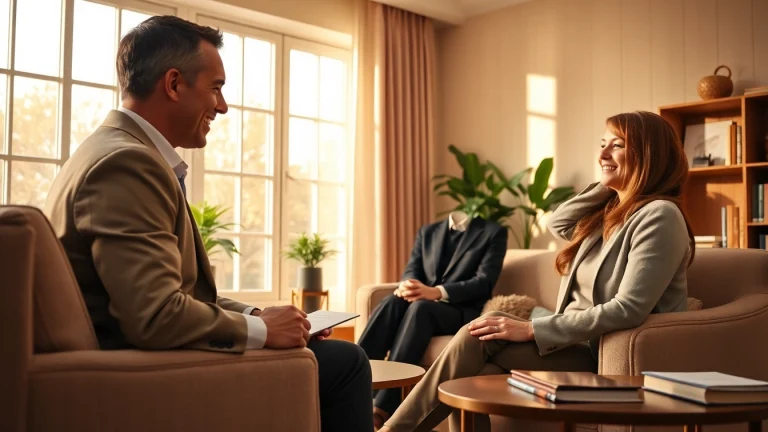
Nurturing Connections: How a Relationship Coach Can Transform Your Love Life
Introduction to Relationship Coaching
In an increasingly complex world, building and maintaining fulfilling relationships can often feel overwhelming. This is where the expertise of a relationship coach comes into play. Relationship coaching is a unique approach that helps individuals and couples navigate the intricate landscape of their emotional connections. Whether facing communication barriers, intimacy issues, or simply a desire for personal growth within relationships, a relationship coach can offer invaluable insights and strategies.
What is a Relationship Coach?
A relationship coach is a trained professional who specializes in improving personal and interpersonal relationships. Their practice focuses on guiding clients through various relationship dynamics, whether that involves romantic partners, family members, or friends. Unlike therapists who often dive into psychological issues and past traumas, relationship coaches focus on the present and future, providing actionable advice to help clients develop healthier relationships and achieve their personal goals.
How Relationship Coaching Differs from Therapy
While both therapy and relationship coaching aim to improve individual well-being and interpersonal dynamics, the methodologies they use can differ significantly. Therapy is typically more introspective, often exploring deeper emotional issues from the past, whereas coaching is generally more action-oriented, focusing on setting goals and achieving desired outcomes in the present and future. Additionally, therapies are often led by licensed mental health professionals, while coaching is less regulated, allowing for a broader range of backgrounds among coaches.
Benefits of Working with a Relationship Coach
Engaging with a relationship coach can lead to numerous benefits, including:
- Enhanced Communication Skills: Learn to express needs and wants clearly and effectively.
- Conflict Resolution: Develop strategies to manage and resolve disputes amicably.
- Improved Emotional Intelligence: Gain insights into your emotions and the emotions of others.
- Goal Setting: Collaboratively set and achieve personal and relationship goals.
- Self-Discovery: Explore personal values, beliefs, and behaviors that affect your connections.
The Role of a Relationship Coach
The role of a relationship coach extends far beyond mere advice; they act as facilitators of change and growth. Their primary objective is helping clients understand and achieve their relationship goals.
Understanding Individual Needs and Goals
A successful relationship coaching process begins with a comprehensive assessment of individual needs and desires. Coaches often conduct interviews and use various assessment tools to identify the current state of the client’s relationships and what they wish to change or improve.
Techniques Used by a Relationship Coach
Various techniques may be employed by a relationship coach, including:
- Active Listening: This technique encourages clients to articulate their thoughts and feelings without judgment.
- Role-playing: Coaches might simulate scenarios to help clients practice their communication skills.
- Goal-Setting Frameworks: Techniques such as SMART goals help clients clearly define their relationship aspirations and develop actionable pathways to achieve them.
- Mindfulness Practices: These practices can assist clients in becoming more aware of their emotional responses and enhance their interactions with others.
Measures of Success in Coaching
Success in relationship coaching can be assessed through various measures, including:
- Feedback from Clients: After sessions, coaches often request feedback on perceived growth and satisfaction levels.
- Achievement of Goals: Tracking the progress of set goals helps indicate the effectiveness of the sessions.
- Improved Relationships: Clients should notice positive changes in their interactions with others.
Common Challenges Addressed by a Relationship Coach
When it comes to personal relationships, various challenges arise that a relationship coach can help manage effectively. Some of these prevalent issues include:
Improving Communication Skills
Communication is the bedrock of any relationship. A relationship coach can assist clients in developing clear, open, and effective communication strategies. This often involves understanding non-verbal cues, practicing empathy, and learning to articulate needs without conflict.
Navigating Conflicts Effectively
Conflict is inevitable in relationships; however, how conflicts are managed can significantly affect relationship health. Coaches equip clients with techniques for de-escalating arguments, reframing disagreements as opportunities for growth, and employing collaborative problem-solving skills.
Building Emotional Intimacy
Emotional intimacy is crucial for deep, fulfilling relationships. A relationship coach can guide clients through exercises designed to foster vulnerability and trust, enabling deeper connections between partners.
How to Choose the Right Relationship Coach
Finding the right relationship coach is critical for achieving desired outcomes. Here are essential criteria to consider during the selection process.
Key Qualities to Look For
When searching for a relationship coach, consider these key qualities:
- Experience: Look for coaches with a proven track record in relationship coaching who have helped others achieve similar goals.
- Accreditations: While not always necessary, certifications can indicate a professional level of training.
- Empathy: A good coach should demonstrate the ability to understand and share feelings, creating a safe space for clients.
Questions to Ask During the Initial Consultation
Before committing to a coaching relationship, ask potential coaches the following questions:
- What is your coaching philosophy?
- Can you describe your approach to coaching?
- What kinds of clients do you typically work with?
- What kind of outcomes can I expect?
Evaluating the Coach’s Approach and Style
Understanding a coach’s methodology is crucial for selecting the right match. Some methods may resonate more than others depending on your preferences, so consider the compatibility of their approach with your needs.
Success Stories and Testimonials
To gauge the effectiveness of a relationship coach, it can be helpful to look at their success stories and testimonials from previous clients.
Real-world Impact of Relationship Coaching
Numerous individuals have experienced transformative changes in their relationships through coaching. These success stories can showcase not only personal growth but also improved dynamics in romantic partnerships, friendships, and family relationships.
Case Studies of Transformed Relationships
Coaches often share anonymized case studies that detail the journey of clients who overcame specific challenges. These narratives highlight the process of identifying issues, implementing strategies, and ultimately achieving lasting improvements in relationship quality.
Client Testimonials and Feedback
Real testimonials provide prospective clients with insight into the coach’s effectiveness. Positive feedback can affirm trust and expectation, allowing clients to enter the coaching process with an open mind and hopeful outlook.


